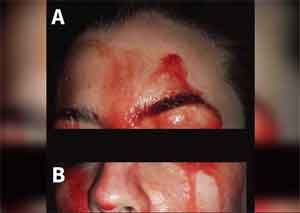- Home
- Editorial
- News
- Practice Guidelines
- Anesthesiology Guidelines
- Cancer Guidelines
- Cardiac Sciences Guidelines
- Critical Care Guidelines
- Dentistry Guidelines
- Dermatology Guidelines
- Diabetes and Endo Guidelines
- Diagnostics Guidelines
- ENT Guidelines
- Featured Practice Guidelines
- Gastroenterology Guidelines
- Geriatrics Guidelines
- Medicine Guidelines
- Nephrology Guidelines
- Neurosciences Guidelines
- Obs and Gynae Guidelines
- Ophthalmology Guidelines
- Orthopaedics Guidelines
- Paediatrics Guidelines
- Psychiatry Guidelines
- Pulmonology Guidelines
- Radiology Guidelines
- Surgery Guidelines
- Urology Guidelines
Doctors stunned by rare case of Italian woman who sweats blood

FLORENCE: Doctors were baffled when a 21-year-old woman was admitted to an Italian hospital for "sweating blood" from her face and her hands, a condition she's had for three years, according to two physicians from the University of Florence.
It's a condition few doctors have seen, and some have questioned whether sweating blood is even possible. Cases of people sweating blood are uncommon, and the Italian floated the idea that the woman may be faking her symptoms.
The bleeding has no clear apparent trigger and can happen while the woman is asleep or during physical activity, wrote doctors Roberto Maglie and Marzia Caproni in a case report published Monday in the Canadian Medical Association Journal. The bleeding becomes more intense, she told doctors, during times of stress, and the episodes can last from one to five minutes. The woman has isolated herself out of embarrassment, and reported symptoms associated with major depressive and panic disorders, doctors said.
Jacalyn Duffin, a hematologist and medical historian at Queen's University in Kingston, Ont., said she had never come across a case of patient sweating blood herself, and that few doctors have. In a commentary that accompanied the case report, she wrote that she was initially skeptical about the condition of the woman in Italy until she dove into medical literature and found that at least two dozen similar cases had surfaced around the world since about 2000.
Of the 42 reports Duffin came across dating back to 1880, almost half had appeared in the last five years, making her wonder whether there has been an increase in cases or if it's becoming more recognized by doctors. Medical writers have previously traced the condition of sweating blood to the story of Christ's suffering and the crucifixion, but hematohidrosis has appeared in scientific literature, too. Two treatises by Aristotle from the third century B.C. reference sweat that either looked like or actually was, blood.
Still, Duffin believes the condition's association with Christianity and religion may make it more difficult for doctors to accept. Since the publication of the Italian case Monday, three people have contacted Duffin to tell her they believe they have the condition.
"That suggests to me that there may be more people who get it," she said. "They either aren't taken seriously by their doctors, or they hide it because it's stigmatized."
Recently reported cases make Duffin believe the condition is both "possible and plausible," as the reports are credible, she said. Patients with hematohidrosis have their blood tested and are monitored by doctors, who look to see whether patients are scratching themselves. The majority of cases involve young women or children from around the world, making it difficult for Duffin to believe that the cases are a result of copycat behavior.
Many of the reports Duffin analyzed documented that the bleeding was preceded by emotional trauma, such as witnessing violence at home or at school. In all cases, the condition was transient, lasting anywhere from a month to four years. But little else about the bleeding, such as its causes or how to stop it, is known, she said.
The woman in Italy so far has been treated with propranolol, a heart and blood pressure medication, which has reduced but not completely stopped her bleeding.
(Reporting by Marwa Eltagouri, The Washington Post)

Disclaimer: This site is primarily intended for healthcare professionals. Any content/information on this website does not replace the advice of medical and/or health professionals and should not be construed as medical/diagnostic advice/endorsement or prescription. Use of this site is subject to our terms of use, privacy policy, advertisement policy. © 2020 Minerva Medical Treatment Pvt Ltd